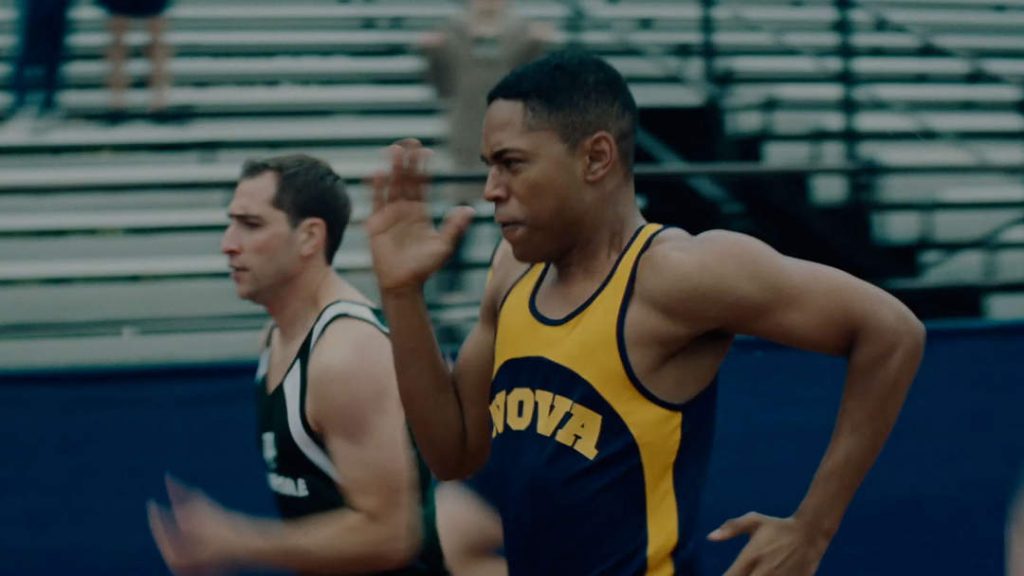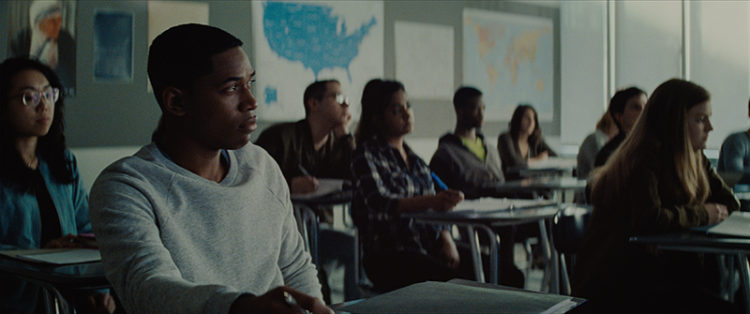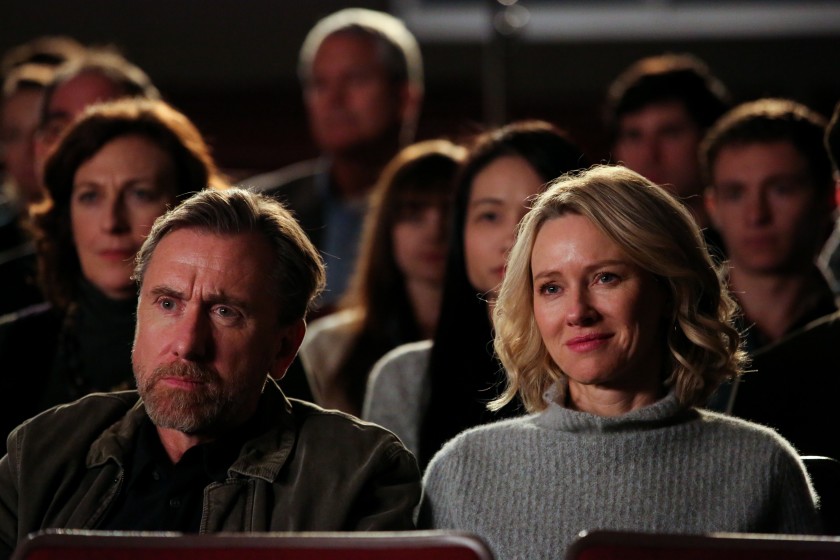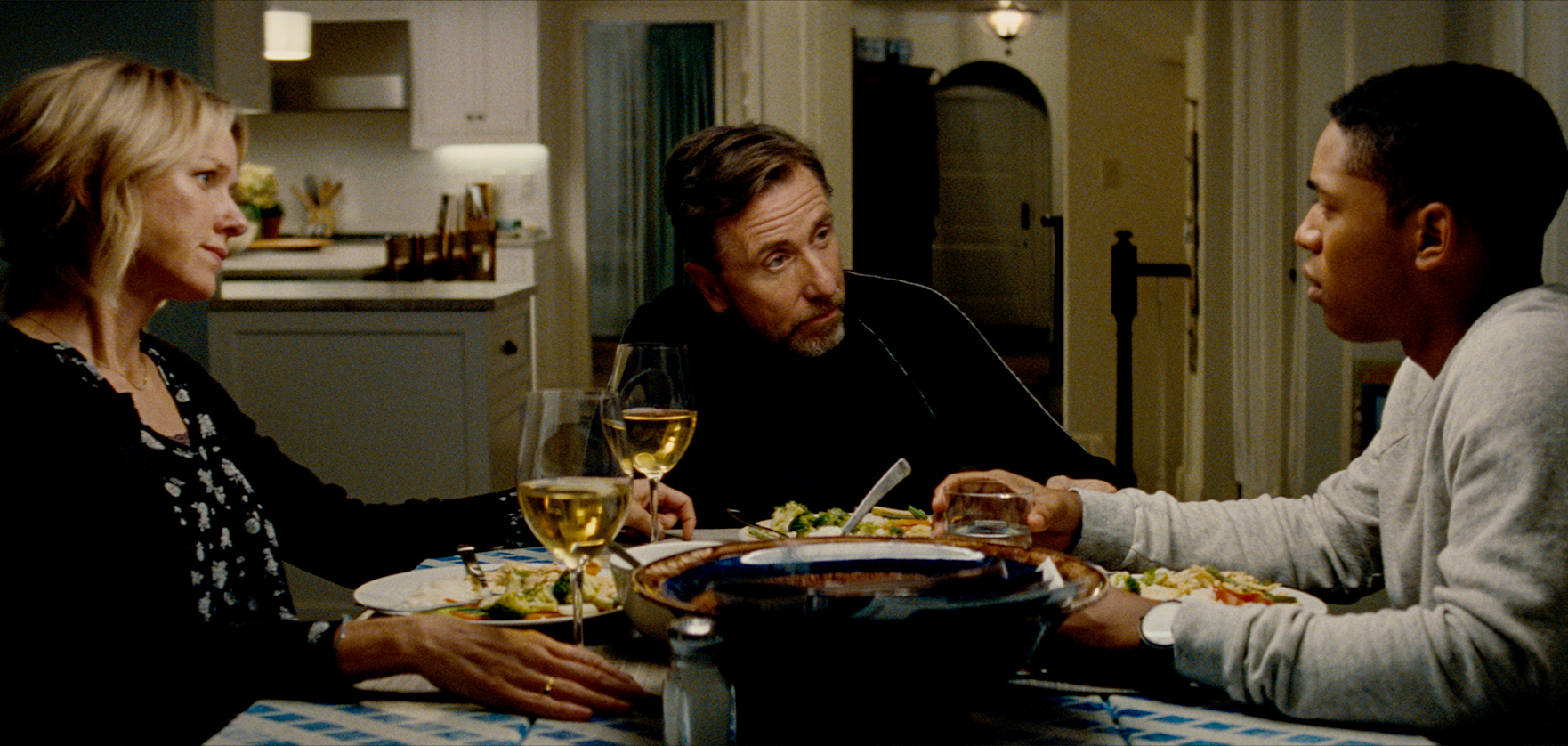First. This walkthrough is going to take serious dexterity and patience to totally unravel the nuances and complexities hidden within this treacherous landscape. I mean, this movie has all the societal landmines possible. The biggest, and most obvious, is definitely race. But there are a million potential Bouncing Betties here that could take our collective legs off if we aren’t careful. I’m sitting in a Starbucks, and the people nearby wonder why I’m breathing into a bag. So, Luce Movie Controversy Unpacked and Explained, is my attempt to fix this mess.
First a quick overview as to what this movie is all about, and why it’s so complicated to me personally. Luce tells the story of an adopted child from war-ripped Eritrea, who is now an all-star accomplished multi-hyphenate high school student. He’s an accomplished debater. He’s an athlete. And a straight A student. But when Luce and his history teacher clash, the escalation has incredible repercussions for both of them. It’s drama styled film, but it’s really a thriller in a drama-esque costume. And as for the personal connection – about a year ago I adopted two boys out of Haiti. An adoption that has not gone well at all. Enough said on that front, suffice it to say that this film hit way way too close to home on many fronts.
If you haven’t had a chance to see the film yet – you can watch it right here:
Alright – from here on out, I’m going to assume you are of the Luce Partaken. Otherwise you will be horribly ruining a brilliant potential filmic experience. Don’t do that to me. Heck, don’t do that to you!
Quick Luce Movie Walkthrough
Luce Edgar (played by Kelvin Harrison Jr. – known for his fantastic turn in It Comes at Night) is the walk-on-water, adopted child from Eritrea, who is perfect…in every way. As I said above he’s a state debate champ, a runner, a fantastic student, he’s perfect…maybe even the black second coming. The problem is that he’s too perfect. No one can maintain that level of perfect. And it all comes to a head when his history teacher Harriet Wilson (played by the fantastic Octavia Spencer, Shape of Water, Snowpiercer, and cough cough Hidden Figures cough cough cough. Gah, something in that Starbucks I just sipped. Sorry.) busts Luce’s friend, DeShaun, for weed found in his locker. Got it? In one corner is perfect (black, adopted, multi-hyphenate, from war ravaged Eritrea) and in the other corner is an intensely opinionated (black, smart, female) history teacher. All the rest of this movie is window dressing and show, it all comes down to these two characters and immovable forces.
Luce gets pulled under the gaze of Harriet’s questioning eye when Luce writes a paper, written from the perspective of Frantz Fanon. If you’d like to read more about him – he’s an interesting, and inflammatory figure. (Literally flammatory). And apparently, Luce was a child soldier…so yeah, that’s a bit of gas to be poured on this particular paper. But, the bigger issue, was that Harriet went through Luce’s locker and found illegal fireworks in his locker. (Rabbit trail, the only real time I ever got in trouble at school was when I was suspended for selling (at AN AMAZING MARK UP) fireworks in a high school BATHROOM (you literally can’t make this crap up). The school resided in the people’s republic of Maryland – which didn’t take too kindly to fireworks. And after buying a brick or two of firecrackers in the looser regulated state of Ohio I was sitting on a gold mine of cash. Or so I thought. So yeah, when I was busted (did I mention I got caught in the BATHROOM!?!? gah!) the principal called the fire department and the police department to have a chat with me. That was a good time.) And when Amy (played by Naomi Watts, uh, Birdman, The Ring, and Mulholland Drive) learns that Harriet has gone through Luce’s locker she literally unhinges. She takes the fireworks, and the paper, and promises to talk to Luce about them both…which, she really doesn’t do. This movie is one enormous cooked grenade after another, tossed into a boiling vat of acid.

At dinner that night, the family, Amy, Luce and Peter (played by the brilliant Tim Roth – minus his divine British accent – who you know from Pulp Fiction, but you should know from Rosencrantz and Guildenstern are Dead.) discuss Harriet and some of the strange things she’s done in class. Like singling out Stephanie Kim, who had allegedly been sexually abused at a party. And Luce is held up as a shining light on a hill…which, is not how he wants to be seen at all. Can you say, TOKENISM? But more importantly, Luce finds the hidden paper and the fireworks. So, we know, Luce knows, that the parents know. Got that? Good.
Now – Luce, the next day, apologies to Harriet about the paper. But it was one of those – I’m sorry I’m not sorry apologies. You know the kind – “I’m sorry you are so sensitive that you couldn’t handle life, the universe and everything…but yeah, I’m sorry.” sort of an apology. And then he starts soliloquizing about holidays, and how the only holiday he’d ever heard of in Eritrea was Independence Day (from colonialism, thank you very much Mr. Fanon), and so it was by far his favorite. Well – yeah, Harriet, is triggered out of her ever-loving mind. Understandably. (Can I PLEASE talk about Trump Jr.’s new book entitled Triggered? Puh-LEASE?!?! OK, I won’t. You guys are killjoys!) Later, there is an encounter between Luce and Harriet’s sister, Rosemary, at the grocery store. Rosemary suffers from a mental disorder, but was recently checked out of a mental institution to live with her sister. But that night, Rosemary trashes the house, and Harriet takes her back and drops her off at the institution.
Now, possibly the most important conversation in the entire movie…one that probably most people just glossed over as it was happening. At a car-wash fundraiser for the school, Luce and DeShaun talk, and DeShaun gives Luce crap about being the chosen one. But Luce promises that he will make things right. Hrrmmmm. What could this mean for our golden child? He’ll file an official petition with the superintendent and get DeShaun reinstated at the school officially?? Uh, no. Something is going on here. And soon after, Amy goes and chats with Stephanie to let her know that she is there for her, but she needs to be honest about what is going on. Stephanie let’s the shoe drop that Luce and Stephanie “used to” date. Hrm. OK. Well, this is news to Amy. Amy, who is a helicopter parent to Luce. How could this have happened!? But don’t lose your cool Amy, this is important!! hahahah. Amy then pushes Stephanie to find out if Luce had participated in the game that sexually exploited Stephanie. Stephanie vehemently denies that Luce was involved.
OK, stop for a second. Are you realizing that J.C. Lee, the screenplay writer, is handing us two alternative realities simultaneously? One where Luce is the golden child, and true, he might snap, but he hasn’t yet…he’s just misunderstood. The other is a Luce that is the prime mover of all the chaos happening throughout the film. Let me give you a hint…the correct answer is not something in the middle of these two realities. It’s one or the other.
Enter Rosemary’s breakdown. You know, the one where she strips naked and has a complete mental episode in the lobby of the school. Later that night, Harriet’s home is vandalized with racial vitriol spray painted across the back of her house. Soon after, Stephanie arrives and appeals to Harriet, telling her that she was raped by Luce. And with that Principal Towson pulls everyone together – Luce, Amy, Peter, Harriet…and waiting in the wings is Stephanie. Harriet makes her accusations of the attack on her house, but Luce dodges that bullet quickly by showing video footage from that night where he and Stephanie are out with others. But when Harriet retreats to the fireworks, and asks Amy to confirm the allegation, she lies, and says she knows nothing about the fireworks. The principal takes Luce’s side, and quickly ends the meeting. Later that night, SURPRISINGLY, and RANDOMLY, fireworks go off in Harriet’s classroom, starting a small fire. Simultaneously, we learn that Towson is firing Harriet because of his suspicions against her. (Now, I don’t know if you’ve ever fired anyone, but no, this is not how firings happen, ESPECIALLY inside the school system… but OK.) Now, Amy, having learned of the firework incident, books it home in order to verify that the fireworks are still where she put them. AND OF COURSE NOT…they aren’t there.

So – stop – what does that mean? Yeah. It’s pretty obvious. But you need to get over your racial biases and your screenplay assumptions in order to realize that Luce is our bad guy here. But he is our token black guy, he is the one that we can restore our faith in people of all colors and racial backgrounds! Yeah, it’s that sentiment, it’s that idea that this movie is attacking. It is this tokenism that Luce is tearing down intentionally and deliberately. Yes? Is it clicking now?
And this fact is just confirmed and backed up by the final encounter between Luce and Harriet. Luce heads to Harriet’s house to talk to her about how she ruined DeShaun’s chance at an athletic career. To talk to her about how she had put Luce on a pedestal, and that she shouldn’t have. That she was just stereotyping them both in their own distinct ways. And after Luce leaves, Amy tracks Luce, and follows him to a shack where he and Stephanie have sex.
Wait, Amy?!? What just happened to you? Yeah, you got played darlin’.
The Ending of Luce Explained
At the very end of the film, Amy and Luce ‘reconcile’ at the spot where Amy had always hidden Luce’s Christmas presents. (Did you catch that? Amy put the fireworks where she always hid everything? But Luce knew about them all along. And better yet, she didn’t know that he had known what all his presents had always been!) He then goes on to give the perfect speech about his past, and his life, giving thanks to his parents for raising him and making him the great person he is today. Hahahah. Ouch. And then as the movie ends, Luce, while on a run, screams at the screen.
The only other film that I’ve ever seen that worked as hard as Luce to run counter to social expectations and stereotypes would be What Keeps You Alive. I was so agog watching What Keeps You Alive I went out of my way to find Colin Minihan to ask him a few questions, which seem prescient for this film as well:
THiNC. – “Was there broad resistance to you creating a lesbian psychopath serial killer? Seems like something one could easily get pilloried for lately.”
Colin Minihan – “No, because I green lit the film myself.”
THiNC. – “And that, my THiNC’ing friends…is why I love independent film so much. What about reactions after the fact? Has that been troublesome at all? Personally? I loved the right hook. LOVED it. Totally didn’t see it coming. (Went in to the movie blind, so that helped.)”
Colin Minihan – “The reaction seems positive in the LGBTQ community so far. That is because this isn’t a film about sexuality…It is a film about a psychopath that just happens to be a lesbian. Hopefully it is normalizing simply seeing a same sex couple lead a genre film.”
Here, Luce does something similar – it preyed on your weakness. And right now, I’m not saying anything racial at all. I’m just talking about expectations, and societal norms about what is expected. You assume that the film industry will cast against type. You assume that Luce will prevail and be a good kid, in order to rectify years of misunderstandings and horrible depictions of the African American community. Which, is all 100% true. But, it’s so true, that it is used against the viewer. You go in expecting to see that Luce will be vindicated, and that he’ll shown as the hero of this journey.
But where J.C. Lee confuses us some, is in the casting of a black woman as Luce’s accuser. Harriet goes from the stereotyping, tokenizing viewer of Luce’s successes, to being the only one who saw Luce as he was. She saw through him…but then we pilloried her as a killjoy. We doubt her because of all that is going on in her life.

BUT WHAT ACTUALLY HAPPENED???
If you’ve gotten 2,200 words into this review, and you are still confused as to what actually happened, God bless you. I’d like to give you a hug. And I hate hugs. (Bit of a claustrophobe when it comes to closeness to other humans. Yes, I am a sociopath. This is a true statement.)
So, starting from the beginning – Harriet hailed Luce as the second coming. She demonized DeShaun as a stereotypical African American. And she belittled Stephanie as a quiet, sexually abused, Asian female. The rest of the movie was a culmination of this wrong that Harriet committed with these three people.
As a result, DeShaun is expelled because of Harriet. And Luce and Stephanie, who were dating, are dating, and will continue to date through the end of the movie, decide they are going to dismantle Harriet physically. Luce begins dropping triggering language in his conversations with Harriet. And writes a paper that speaks to being all for violence in the support of a political ideal. Harriet then finds the fireworks he planted in his own locker. Amy gets the fireworks, and hides them, as Luce knows she will. He then escalates on Harriet by manipulating Rosemarie at the grocery store. Which then causes Rosemarie to flip out and Harriet to take her back to the mental institution. That in turn causes Rosemarie’s melt down at school. Then Luce spray paints racist chaos on the back of Harriet’s house, and sets off fireworks in Harriet’s classroom. (Which Harriet had apparently left there after finding them in Luce’s locker…right?)
Luce is basically walking up to Harriet and poking her in the eye, over, and over, and over again. And every time Harriet responds, he pivots, and finds a new way to poke her in the eye again.
Luce grew up as a child soldier, and learned how to confirm to the expectations of the adults in his community. He then came to America and learned to do that over again. But this time, instead of carrying an AK-47 and murdering innocents, he learned to be a good student, and excel at playing this game. And the game is simple once you realize what the rules are. Get good grades. Work hard on your track team. Society is a self normalizing feedback loop. Don’t wobble that feedback loop and everything will be just fine. Do what they tell you to do and voila. But when confronted with one last mounting expectation of perfectionism in his teacher, he decided that was one too many. To watch DeShaun get taken down for nothing…and to see himself lauded…for nothing…he decided something had to be done.
But in this movie, you are Harriet. I am Harriet. We do this all the time. We stereotype by race, but gender, by intelligence. Trust me, walking into a crowded room with two black children under my wing definitely calls out all the stereotypes really really quickly. And in a very short time I saw it all. I saw the racism. The tokenism. The heaps of praise for myself and my wife. (Oh, how I disliked that – so much confusion there. What exactly am I being lauded for exactly? Being rich? Being so benevolent? What?) And this movie just dumps all those tokenist ideas out on the table and just calls each one out. I don’t think the movie is saying we shouldn’t try and resolve the horrible racist past of the United States of lynchings and the like. What it is saying is that we are in a still horrible place, caused by the pain of our past, and we should allow everyone to just be themselves. That evil wears many faces.
When I first thought about doing this write up, I considered just going character by character to talk through their particular biases and racism’s. Peter being the only one who saw it all clearly, and yet he was cowed by his wife’s concern by her “fragile” son. It would be an interesting spin on the film. Definitely would have given us a different view of what was really being said here. But I think these biases become pretty obvious once you have realized what actually is happening in this film. Right? Please tell me I am right here, and that I didn’t do this entire 3,000 word write up incorrectly! hahaha.
Edited by: CY


